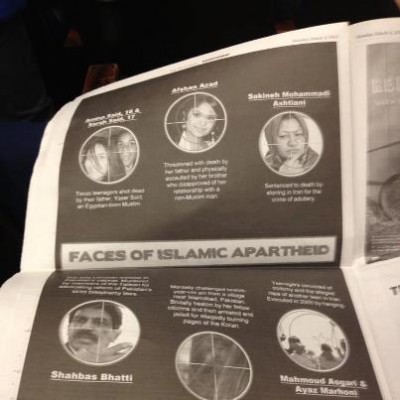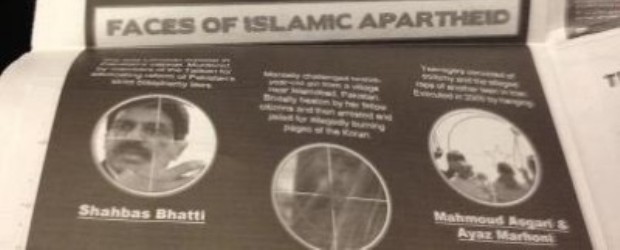
Happy March, everyone! St. Patrick’s Day will be here soon, Passover’s not too far off and, despite a whole ton of snowfall in a few corners of the country last week, things are warming up.
But as we all know, March is a special time on campuses all around the world. It’s when Students for Justice in Palestine chapters all around the world organize their (in)famous annual event, Israeli Apartheid Week. And as a result, this is when folks in the pro-Israel camp wrestle with it — or, in as many cases as not, this is when they completely lose their heads, crying bloody murder from their dorm room windows.
The first Israeli Apartheid Week occurred at the University of Toronto in 2005. It has since grown into a worldwide phenomenon, with 215 participating cities last year. Its mission is to “educate people about the nature of Israel as an apartheid system and to build Boycott, Divestment, and Sanctions (BDS) campaigns as part of a growing global BDS movement.” Tactics of Israeli Apartheid Week generally include guest speakers, mock “Apartheid walls” and the display of particularly provocative and/or bloody photos, among others.
Because of the week’s vocal presence on college campuses, many pro-Israel students felt the need to respond. Over the last few years we’ve seen a variety of different “Israel Peace Weeks,” occasionally student-run and occasionally organized by off-campus Israel-advocacy organizations, generally put together to either directly or indirectly counter the effects of Israeli Apartheid Week on a given campus. Other campus groups have organized counter-protests at Apartheid Week events, circulated petitions, and a wide variety of other responses, ranging from docile to argumentative to hostile.
This year, an entirely new week has commenced, and we feel fairly comfortable placing it in the hostile category. Entitled “Islamic Apartheid Week,” and organized by the right-wing David Horowitz Freedom Center, this new contributor in the yearly war on words is particularly disconcerting. The organizers of this week describe it as “a series of campus campaigns that focus on the gender and religious bigotry and persecution practiced by the Arab countries of the Middle East.”
Here’s how the David Horowitz Freedom Center chose to go about exposing this “gender and religious bigotry.” They published an ad in the Tufts Daily, shown above, where a number of Arabs are depicted as if the target of a gun. Subtitles reference the mistreatment of these individuals by Islamic governments. This ad appeared approximately one year and a half after the same organization published a widely condemned ad in college newspapers across the country entitled “Wall of Lies,” calling Muslim Student Associations “genocidal” and emphasizing the apparently vital role Palestinians played in the atrocities of the Holocaust.
Both Israel Apartheid Week and Islamic Apartheid Week, completely certain of their own correctness and positive that the rest of the world is completely delusional, are making themselves heard loudly on campuses around the United States and the world. Their goals — in the case of Israel Apartheid Week, to build a movement based on economic non-activity and, in the case of Islamic Apartheid Week, to criticize Islam — do not strike us as particularly helpful to conversations on campus, nor do they make it any more likely for Bibi and Mahmoud Abbas to come to any sort of peace agreement anytime soon. What do they do? Through one week of loud screaming and provocative photos, they crowd out the heaps upon heaps of constructive events happening on college campuses to help people learn about the Middle East conflict, creating the illusion that the situation on college campuses with regard to Middle East dialogue is completely and thoroughly dysfunctional.
What bothers us the most about these weeks is that they both seem to agree that bogging ourselves down in language ultimately produces positive results. The original Apartheid Week chose an intentionally inflammatory word. Now that most it’s clear that most in the pro-Israel camp refuse to engage with anyone using the word, SPJ has stuck with it, making clear their disinterest in substantive dialogue. And this year, by inaugurating an Apartheid Week of their own, some in the pro-Israel camp are showing the level of dialogue they’re ready for; it’s as if they’re saying, “Oh, we’re apartheid? No, you’re apartheid!” And so it goes, both sides making the debate about language instead of issues.
The extremists in this conversation both claim to want to talk about the reality playing itself out in the Middle East. If you just put aside emotion and look at the facts on the ground, both sides say, their viewpoints come out on top. We’re asking them to walk the walk instead of needlessly dropping the A-bomb on every conversation.
We’re not asking people to silence their opinions, hold hands and sing Peter, Paul and Mary. We are asking people to use common sense and distance themselves from petty contests over the meaning of a word. By spending time and resources on apartheid weeks of this or that variety, organizations have created contests to see who can show the most gruesome photos, who can utilize the most provocative language and who can build the largest displays on campus. Those contests are not conducive to learning, nor do they do anything to solve the conflict a few thousand miles away from us.
We are no longer interested in finding out what next year’s newest and most creative Israel-Palestine advocacy week is going to be. It is time for a new gimmick. These cleverly named weeks tend to oversimplify the issues, rely too much on especially terrifying imagery and utilize provocative language just for the sake of luring people into an argument. That’s not what we need this time of year. The robins will be a-chirpin’ soon, and I’m pretty sure they’d rather chirp to college students playing frisbee than images of abused children.

